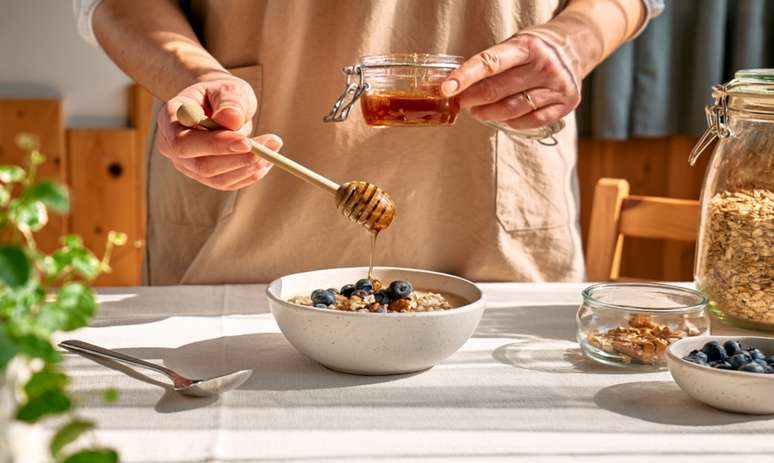The benefits of honey in the diet, for many people, may seem obvious. After all, harnessing its sweet flavor to replace industrialized products, like sugar, tends to be the first thing that comes to mind. However, when used correctly, this natural molasses can provide numerous benefits to the body. however, the […]
The benefits of honey in the diet, for many people, may seem obvious. After all, harnessing its sweet flavor to replace industrialized products, like sugar, tends to be the first thing that comes to mind. However, when used correctly, this natural molasses can provide numerous benefits to the body.
However, the big problem with honey is that, despite being healthy, it is high in calories. Therefore, as with virtually everything related to food, the key to success is balance. In other words, nothing exaggerated.
Therefore, with the help of nutritionist Danielle Bayma, member of the Brazilian Association of Functional Nutrition (IBNF), we have broken down eight benefits of honey in our diet. Watch:
Benefits of honey
- Honey is a food with great antioxidant potential, antibacterial and anti-inflammatory activity;
- It therefore has the ability to improve our cardiovascular health;
- It also increases our body’s defense cells;
- Fights bacteria and fungi.
- Honey is rich in vitamins, minerals, polyphenols, enzymes and fatty acids, which make it a functional food;
- It is anticancer, as several studies show.
In other words, it has apoptotic, antimutagenic and antiproliferative activity.
How to use honey in your diet
“A spoonful of honey a day is the recommended amount. I also suggest consuming this honey at night, if the patient complains of throat irritation or cough. The saliva produced acts on the mucosa of the throat, creating protection”, says Daniele.
Moderation is the secret
The fact that it is a natural sweetener can also be considered one of the benefits of honey in the diet. However, this does not mean that its consumption is completely free. In other words, you need to take some issues into consideration.
“One of these is that honey should not be heated. Temperatures above 40 degrees make it lose its nutritional potential. Furthermore, we cannot forget that it has calories and is a primary source of carbohydrates, so we must pay attention to the quantity ingested”, explains the nutritionist.
Be careful with children
“There is an extremely important observation regarding the consumption of honey in children. It should not be consumed by children under 1 year of age. Children have a more fragile immune system and honey can be contaminated with a bacterium (Clostridium botulinum ) which can cause a serious disease (botulism), concludes Danielle.
Source: Terra
Ben Stock is a lifestyle journalist and author at Gossipify. He writes about topics such as health, wellness, travel, food and home decor. He provides practical advice and inspiration to improve well-being, keeps readers up to date with latest lifestyle news and trends, known for his engaging writing style, in-depth analysis and unique perspectives.






![[Coluna] Does Brazilian protectionism inspire Trump? [Coluna] Does Brazilian protectionism inspire Trump?](https://p2.trrsf.com/image/fget/cf/774/0/images.terra.com/2025/10/16/2008907400-74231636354.jpg)

